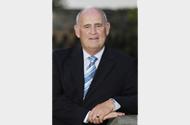Dr Peter Ryder will chair the independent Science Advisory Panel for the selection of Marine Conservation Zones.
Dr Ryder is a physicist who spent most of his career at the Met Office, where he was the former deputy chief executive and director of operations. He worked primarily in the fields of operational meteorology and oceanography.
He has extensive experience in chairing executive and advisory committees and will be joined on the Science Advisory Panel by a group of world-leading marine experts.
The creation of the Science Advisory Panel is one of the first steps the government has taken under the recently enacted Marine and Coastal Access Act. The panel will assist the work to select marine conservation zones.
Dr Ryder said: “I am delighted to have been appointed as chairman of this panel by the Secretary of State, Hilary Benn, and I am strongly motivated to make a success of our collective efforts.
“We are privileged to be able to help construct and promote strong scientific foundations for an effective network of marine protected areas.”
Defra is working with the statutory nature conservation bodies, Natural England and the Joint Nature Conservation Committee, to establish marine conservation zones to contribute to a network of marine protected areas.
James Marsden, director marine for Natural England, said: “Today’s appointment is excellent news and means that work can now begin in earnest to develop proposals for marine conservation zones, which will contribute to an ecologically coherent network of marine protected areas in English waters.
“The Science Advisory Panel’s shared knowledge and expertise is formidable and will ensure that this ambitious, stakeholder-led process is informed by the best available evidence and meets key scientific criteria.”
Four regional projects led by local people with an interest in the use of our seas have been set up to select potential marine conservation sites. The first of the regional projects to be established was Finding Sanctuary, in the South West.
Tom Hooper of Finding Sanctuary said:“Having a strong and experienced chairman for the Science Advisory Panel is a really significant step forward for Finding Sanctuary and the regional marine conservation zone projects.
“I hope the panel will soon forge a strong working relationship with our stakeholder groups to help guide our work to develop a coherent and scientifically robust outcome for England’s marine conservation zones.”
The Marine Conservation Zone Science Advisory Panel is an independent body which has been established to support the four regional projects in the marine conservation zone selection process by offering objective scientific assessment of site proposals, as well as independent advice to ministers.
Panel members have been drawn from a diverse range of marine scientific disciplines in order to ensure a balanced and comprehensive skill set.
The panel members are:
PROFESSOR JULIET BRODIE (Natural History Museum, London)
Professor Brodie is a marine algae specialist, and she has extensive knowledge of the taxonomy, distribution and importance of algae and the activities which impact upon it. She has over 25 years experience as a marine scientist, and her work has included the identification of sites of importance for seaweed and other algae.
DR. MICHAEL ELLIOTT (University of Hull)
Specialising in estuary and coastal science and management, Professor Elliott has worked for 35 years as a marine scientist. He has been involved in many initiatives in the marine field both in the UK and elsewhere during this time, providing advice to many organisations, agencies and government departments, particularly regarding the environmental effects of coastal and estuarine activities and the management of those impacts.
DR. JASON HALL-SPENCER (University of Plymouth)
Dr Hall-Spencer is a lecturer in marine biology at the University of Plymouth, with a strong track record in providing input to the selection of marine protected areas, particularly in areas beyond 12 nautical miles from the coast. He also has personal experience of working on fishing vessels throughout Europe and a history of working within coastal communities.
DR. KEITH HISCOCK (Marine Biological Association, Plymouth)
Four decades of marine biological survey and of using science to support conservation have given Dr Hiscock a wealth of knowledge relevant to the work of the Science Advisory Panel. After leading programmes within the nature conservation agencies, he established the Marine Life Information Network at the Marine Biological Association in 1998 and is now an Associate Fellow there.
PROFESSOR MICHEL KAISER (University of Bangor)
Professor Kaiser has undertaken world-leading research to understand human impacts on the marine environment and the consequences of different management strategies. He has focussed on sustainable fisheries and aquaculture issues, and has held a number of influential positions, including chair of Defra’s Marine Fisheries Stakeholder Forum.
PROFESSOR CALLUM ROBERTS (University of York)
Professor Roberts is well-recognised as one of the key scientific contributors to the film The End of the Line. He has extensive experience in the science and establishment of MPAs and networks around the world. He is author of The Unnatural History of the Sea, an account of the effects of 1000 years of fishing and hunting on marine life. He currently lectures at the University of York.
DR. BETH SCOTT (University of Aberdeen)
Dr. Scott’s academic career as a marine ecologist includes several years working onboard fishing vessels in Alaskan waters. Her research focuses on functional linkages between bio-physical oceanographic processes, flexible life history traits and population dynamics of fish and seabird species. Her work is helping to identify critical marine habitats where predators and prey species interact.
PROFESSOR GRAHAM UNDERWOOD (University of Essex)
Professor Underwood has research experience across a range of disciplines within the marine area, and he specialises in estuarine and coastal systems, especially the ecology and functioning of mudflats, sandflats and salt marshes. He is also a regular contributor to BBC Radio 4’s environment programme Home Planet.

 Get Involved
Get Involved







